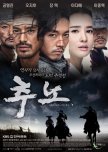Această recenzie poate conține spoilere
Tragic, epic, visually impressive.
"The Slave Hunters" is a cinematic-style KDrama, almost like a movie for the big screen. (It would definitely be an experience on the big screen.) In any case, "The Slave Hunters" has a lot to offer during ist 24 episodes.
There is strikingly selected staging of the landscape. Korea presents itself self-confident with its countless riverscapes and deltas, its mountains and coastal regions. The viewers visually accompany the protagonists on their long journeys across the country.
The accumulation of well-trained, well-structured torsos of the male actors is also characteristic for "The Slave Hunters". There's a lot of work involved, and it's appropriately staged here in numerous shots. Why not?
In connection with its sporty mimes, "The Slave Hunters" also comes up with a variety of brilliant, sometimes spectacularly choreographed fight scenes. Above all, Jang Hyuk once again sets quite a monument with his versatile martial arts skills.
The KDrama also presents - if you like - some Joseon-style parkour. 'Chase' thus gets a nicely invigorating touch. (Side note, in case you don´t know: Parkour is a special form of athletic movement art - a mostly urban steeplechase that has become fashionable in the last few decades. Individuals choose the most effective way to get to their destination, and that's hardly ever the predetermined path. Rather, the urban or natural landscape is re-perceived with regard to potential obstacles and evaluated as to how these can be creatively overcome on the individually chosen route, for example by jumping, somersaults or the like.)
The KDrama also stresses the subject of fatal love triangle in its complex emotionality. Eventually, there are also more love stories in the side plots. Yet, to be honest, the romance aspect should not be your reason to watch... The complicated dynamics might drive you crazy at times, so does the rigid play of the ex-and-again-general.
After all, the story mixes a good pinch of humor with profound wisdom. Surrounded by all the muscle-packed, fast-paced spectacle, the question of how a just society can be achieved is examined, i. e. whether it can ever be achieved at all. As soon as people gain power, won't they always tend to turn their fellow human beings into slaves, chattel or lackeys? And: will a changed political system change the people? Or do people have to change for the system to change? As a premise it is stressed that slaves are also human beings, e. g. that it actually starts with an attitude, that one should not deny any human being to being a human being - certainly not according to their genetic origin. "Slave Hunters" historically refers to the beginning of socio-critical Yangban movements against practiced slavery.
At the same time, the KDrama shows life under simple/poor living conditions - unembellished in all coarseness, e. g. ugly, blustering, brutal, unkempt and uneducated, but still warm-hearted. On the other hand, the fine silk clothings and the well-groomed, educated demeanor of the nobles and officials cannot hide their emotional coldness and corrupted souls.
All in all: It is not surprising that the KDrama in average thrilled more than 30 percent of the South Korean population and received numerous respectable awards and even international nomination. Above all, Jang Hyuk, for whom his role seems to be tailor-made. He fights, jumps, sprints, barks, laughs, cries, digs into the deepest depths of his soul and on top of that presents profound street smart and wise philosophies.
"The Slave Hunters" has a charm of its own. It´s tragic, epic, visually impressive.
---------------- Side Note: --- historical background ----
The historic frame refers to the time of King Injo in the 17th century as well as his son and Crown Prince Sohyeon. As a result of the submission after the second Manchu invasion in 1636, the Crown Prince (together with his wife and other officials) went to Shenyang practically as a hostage of the Qing. He spent his time there working diplomatically on peaceful relations between the Joseon and Qing dynasties.
His commitment also brought him to Beijing, where he became familiar with Western culture through his acquaintance with Jesuit missionaries. However, his father did not like Sohyeon's diplomatic commitment and open-mindedness at all. He feared that after his return and accession to the throne, he would want to reform Joseon with Catholicism and Western values. Prince Sohyeon's sudden death is interpreted by historians as deliberate poisoning. There is some evidence that his own father was behind this. Sohyeon's wife was executed for treason and only the youngest of his three sons survived their exile on Jejudo.
---------------------------------------------------------------------
Considerați utilă această recenzie?


 9
9 39
39 15
15
















